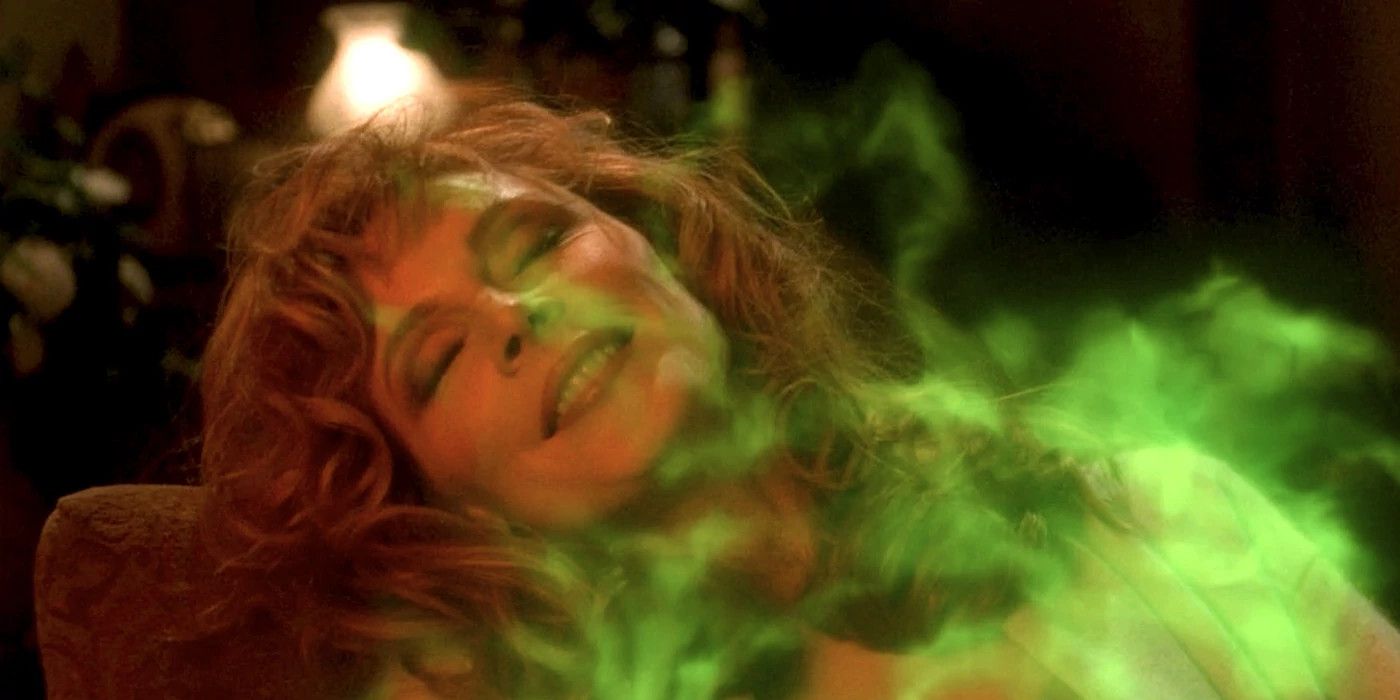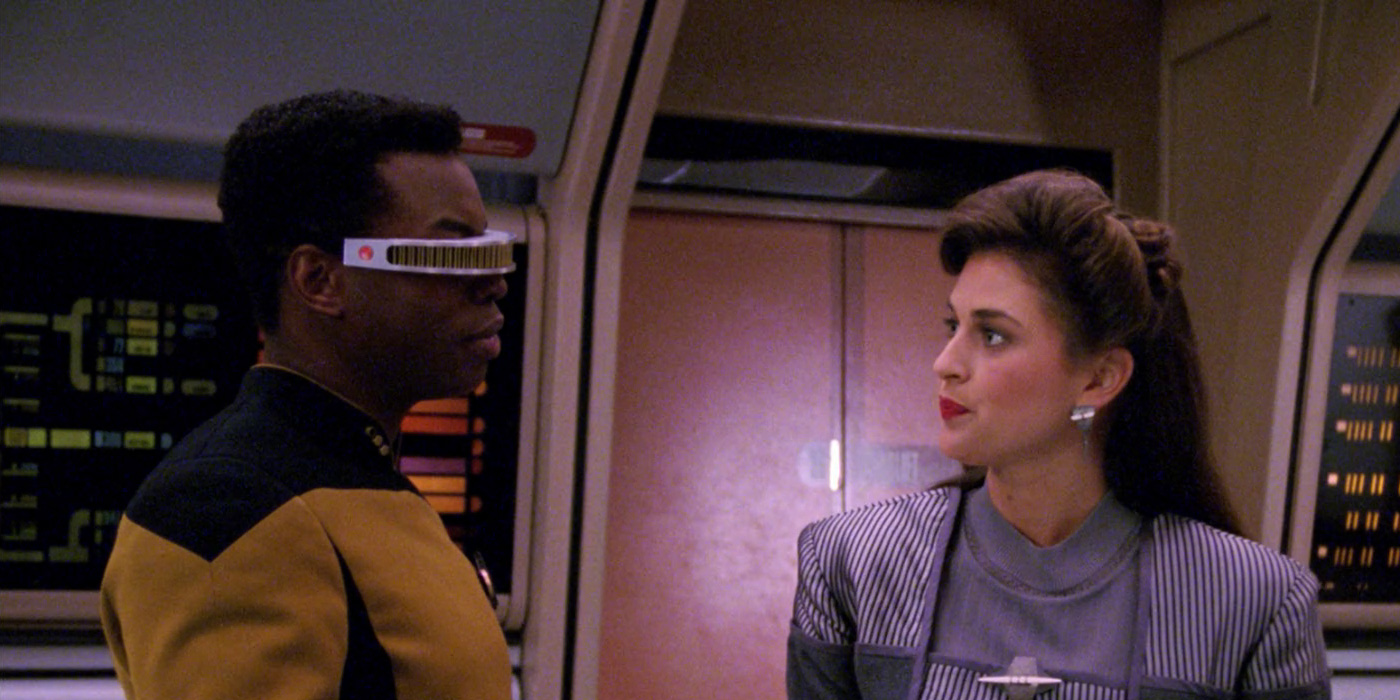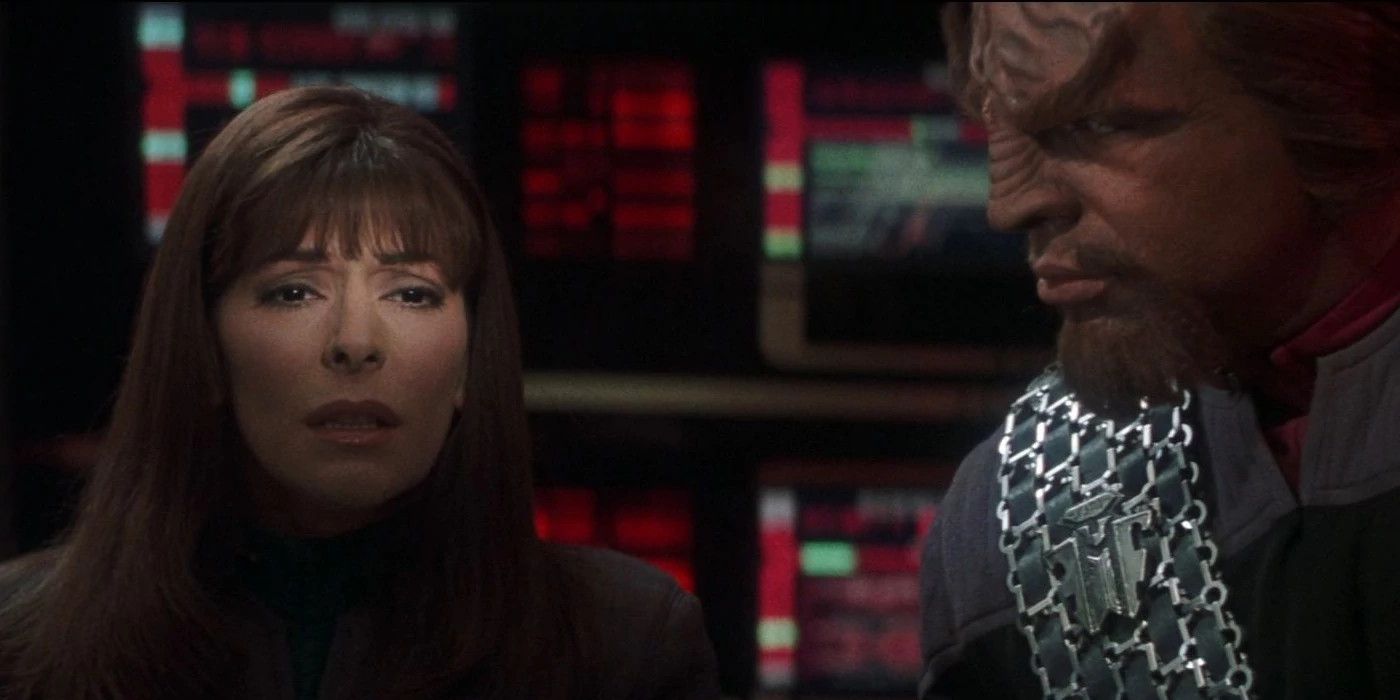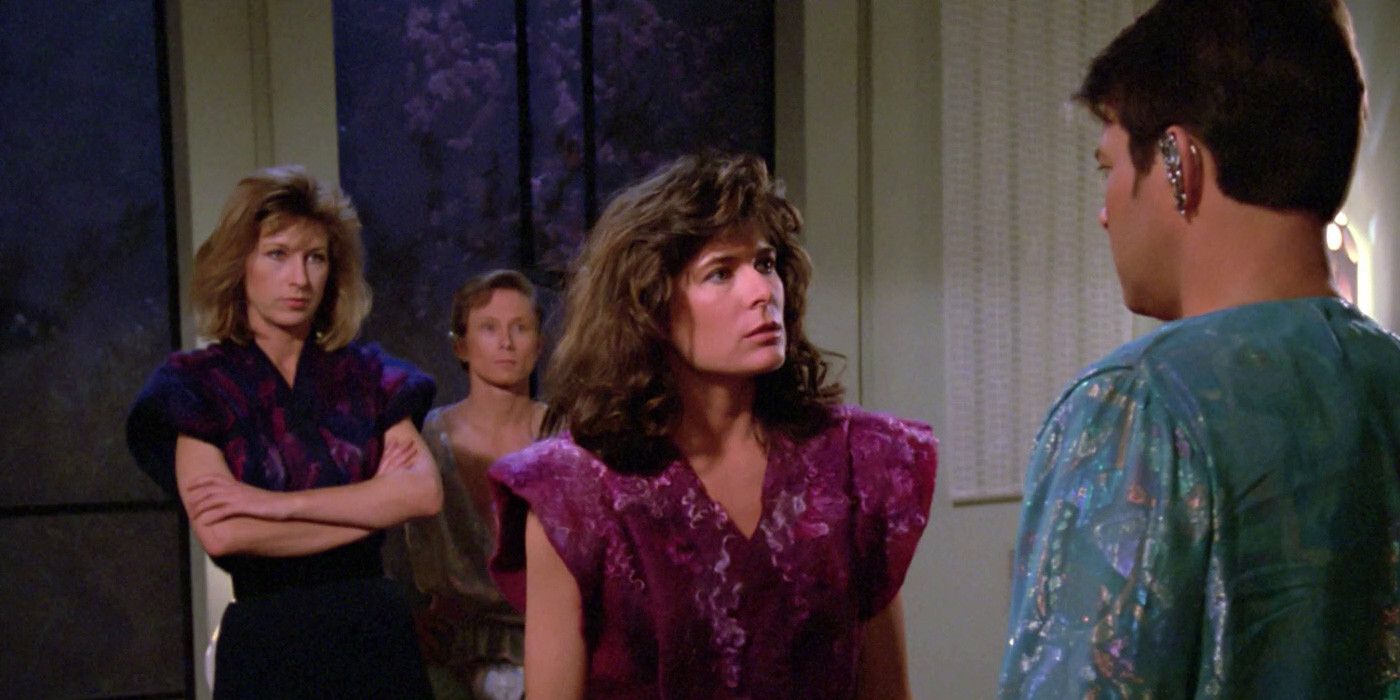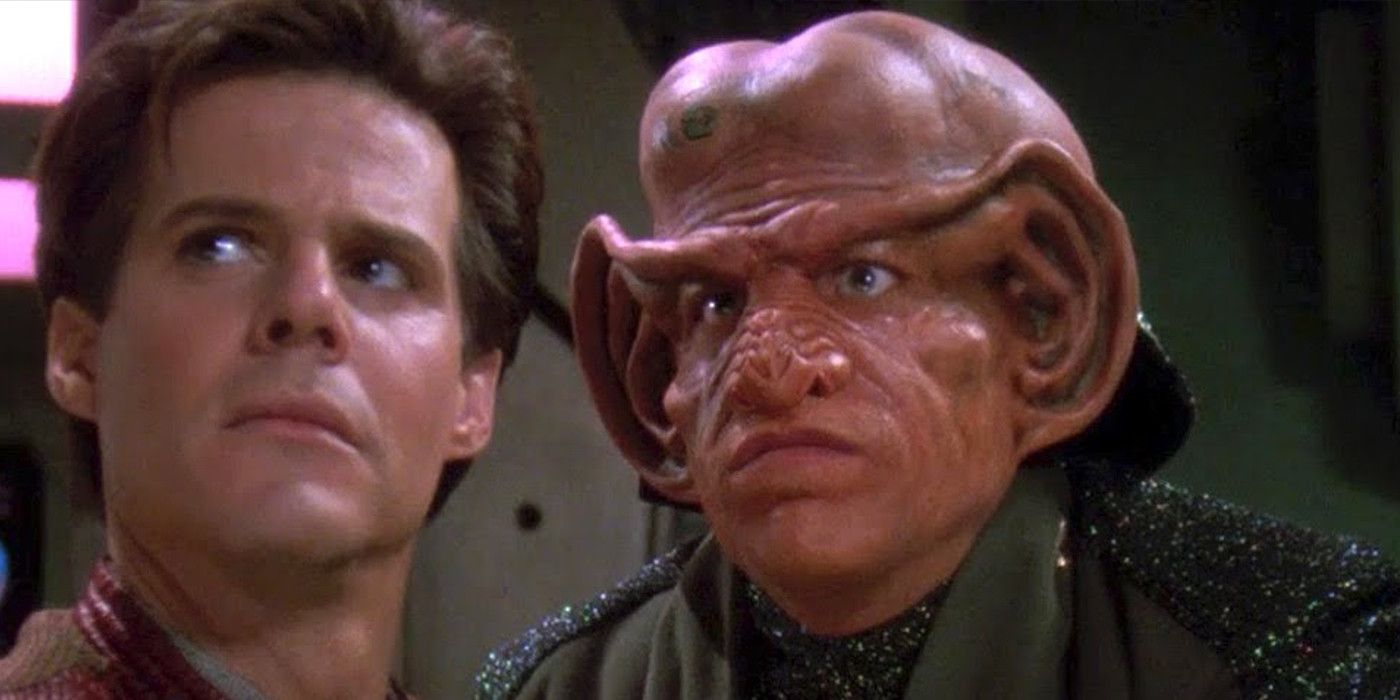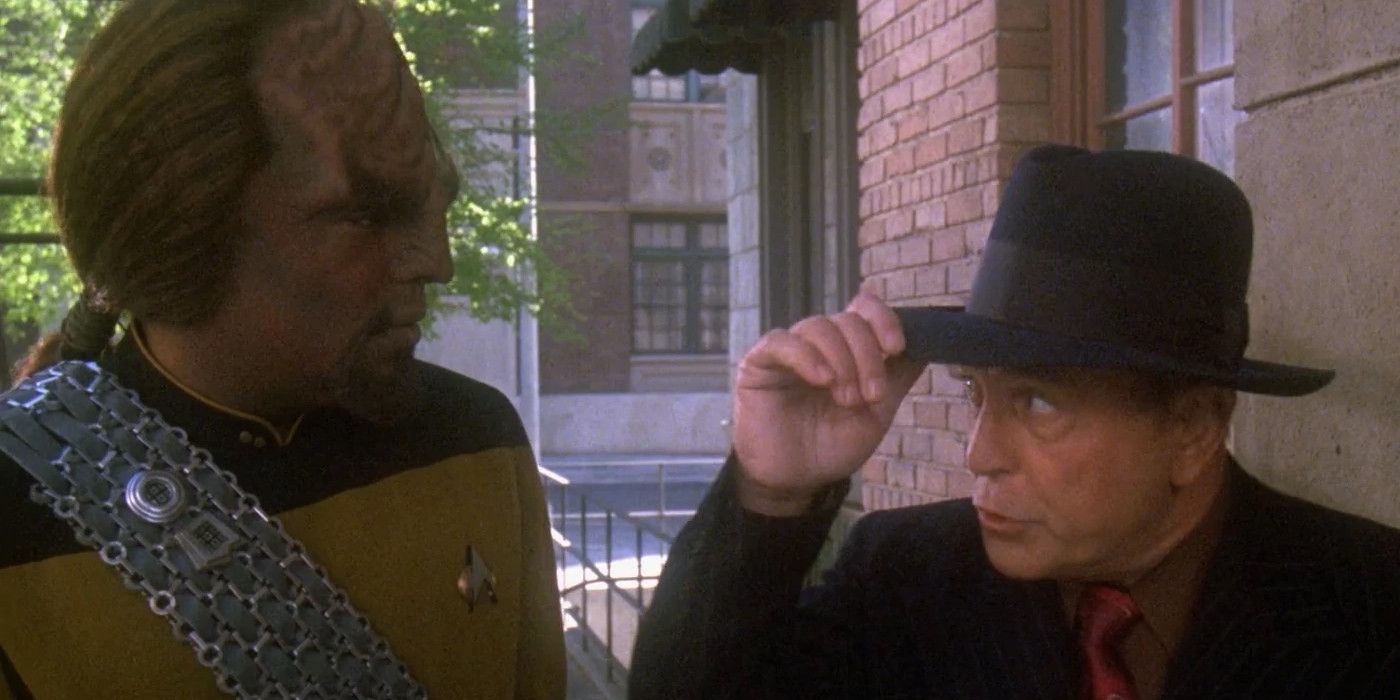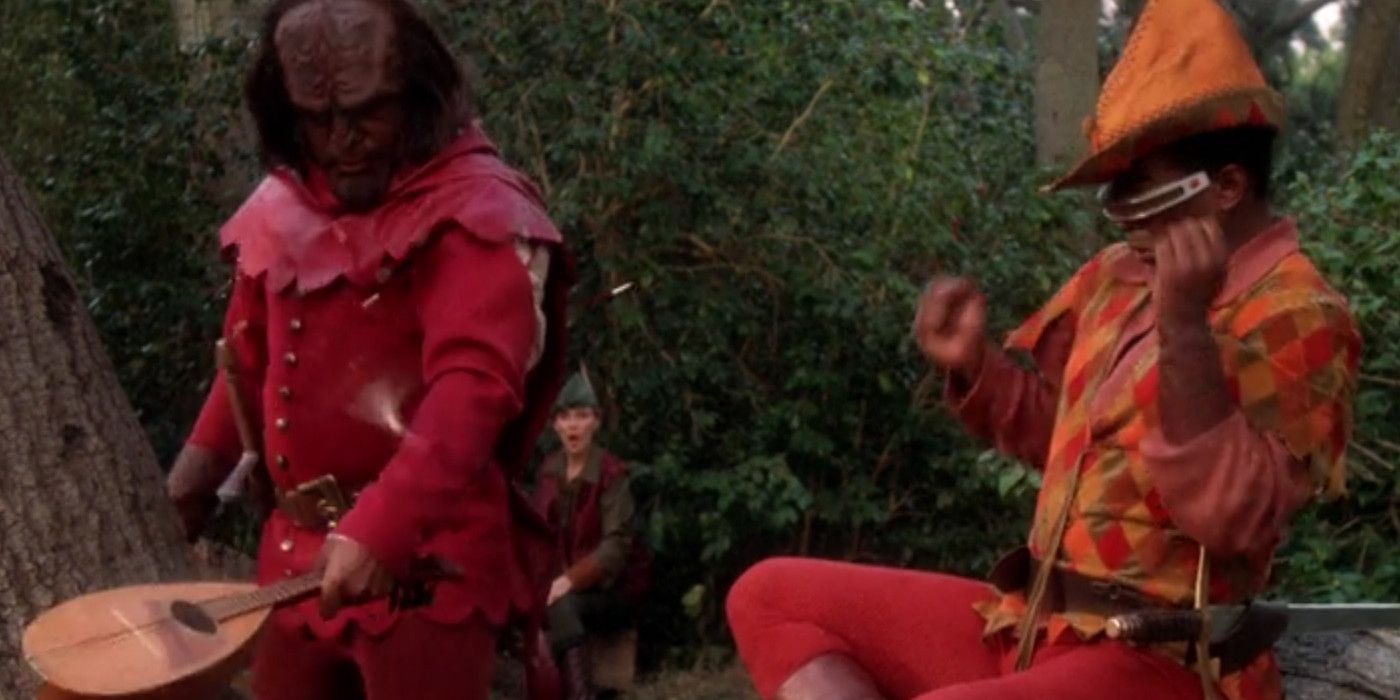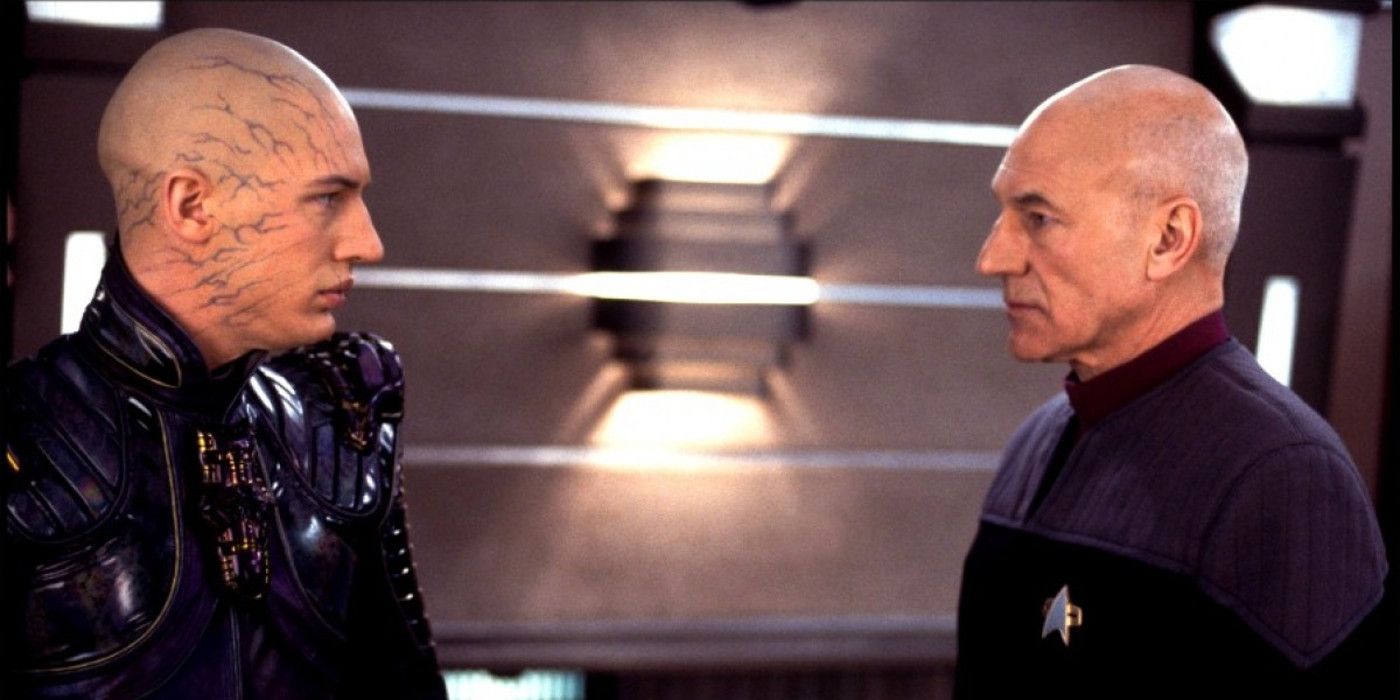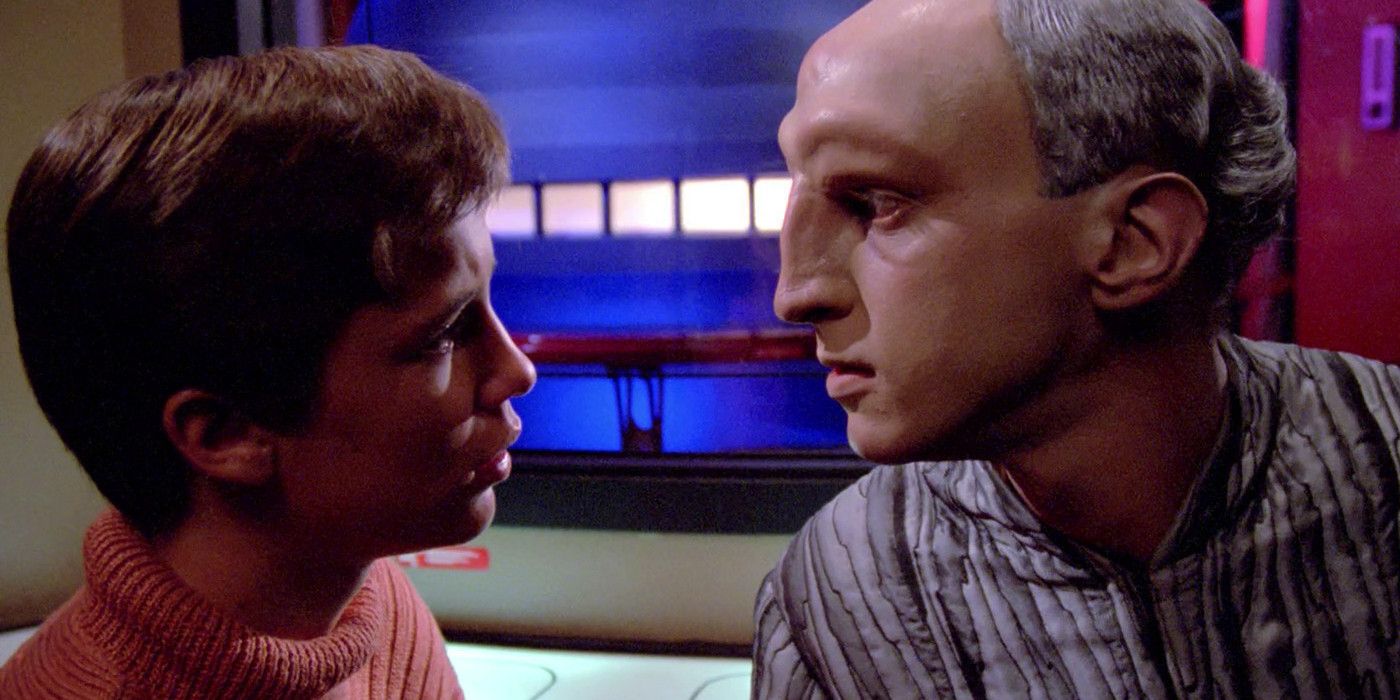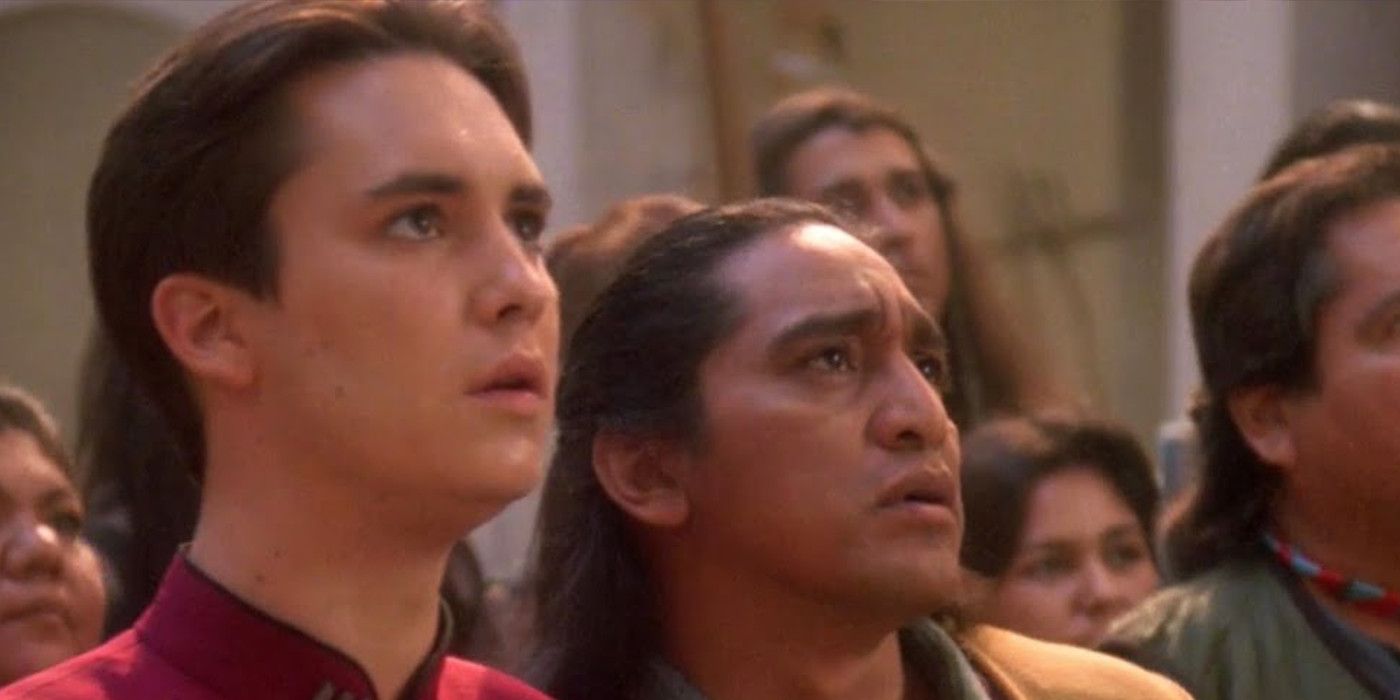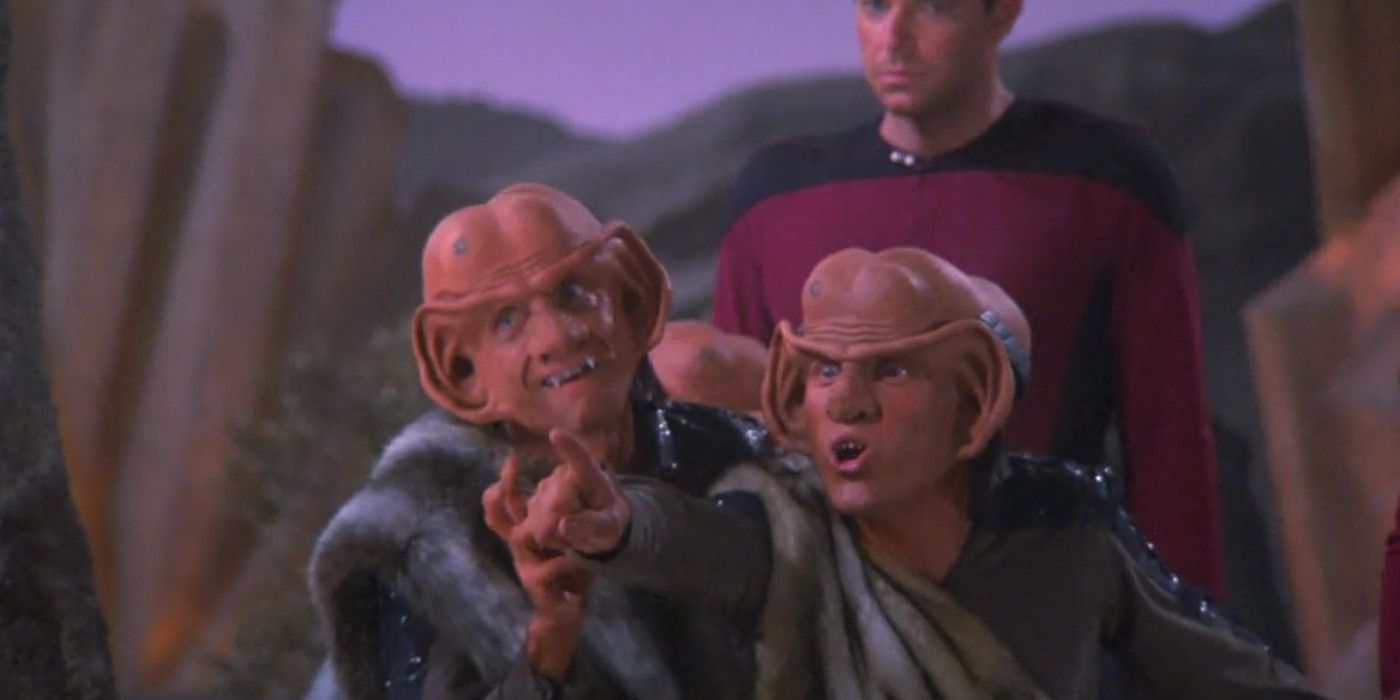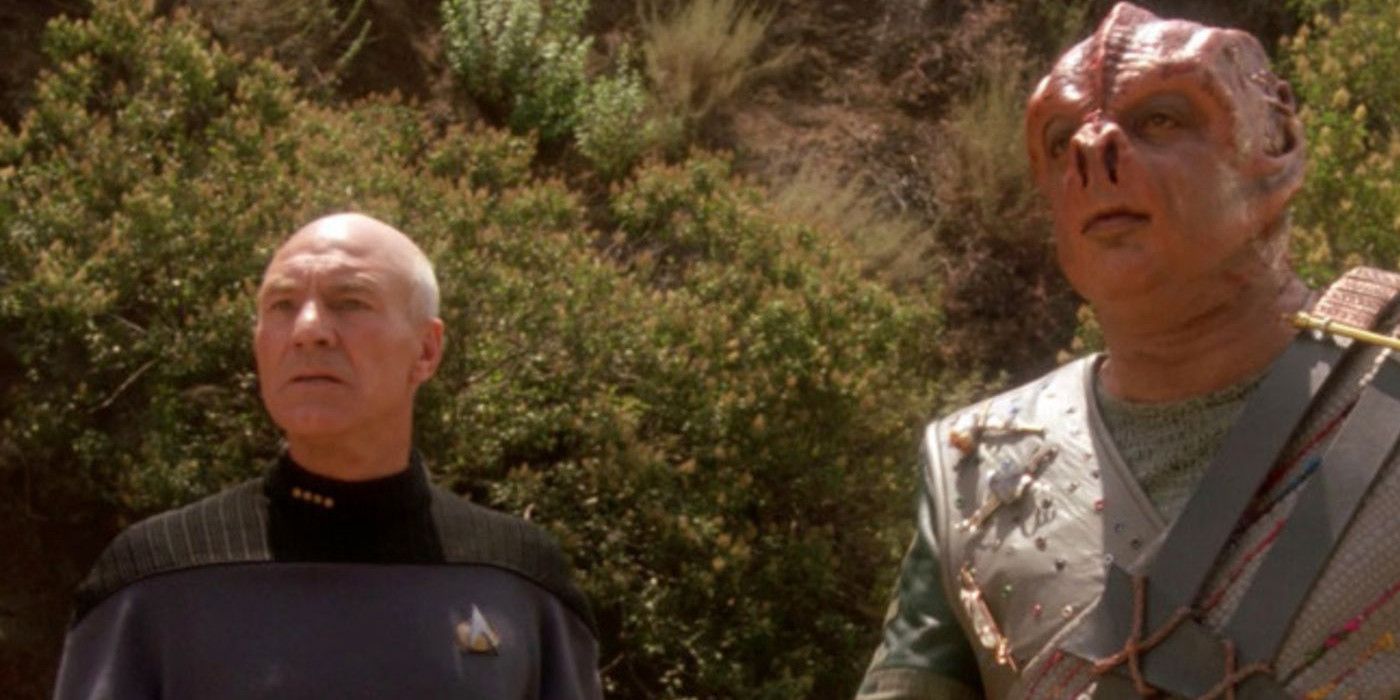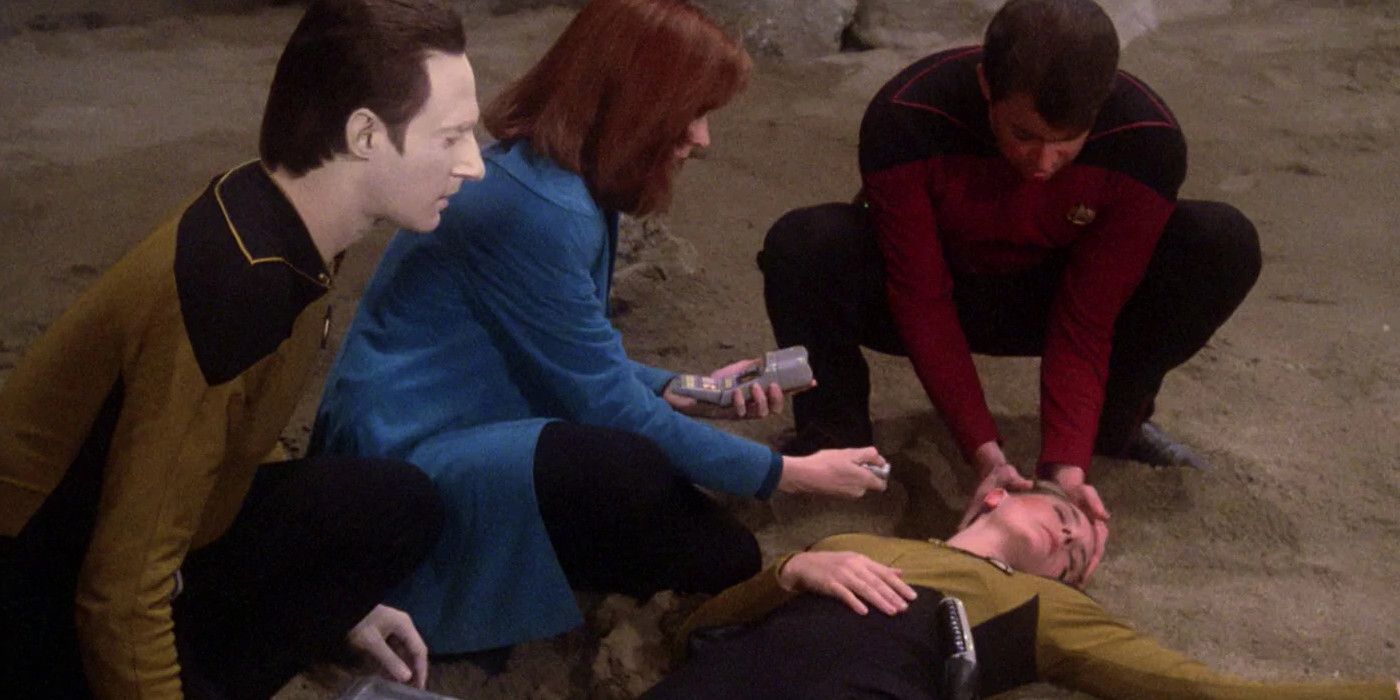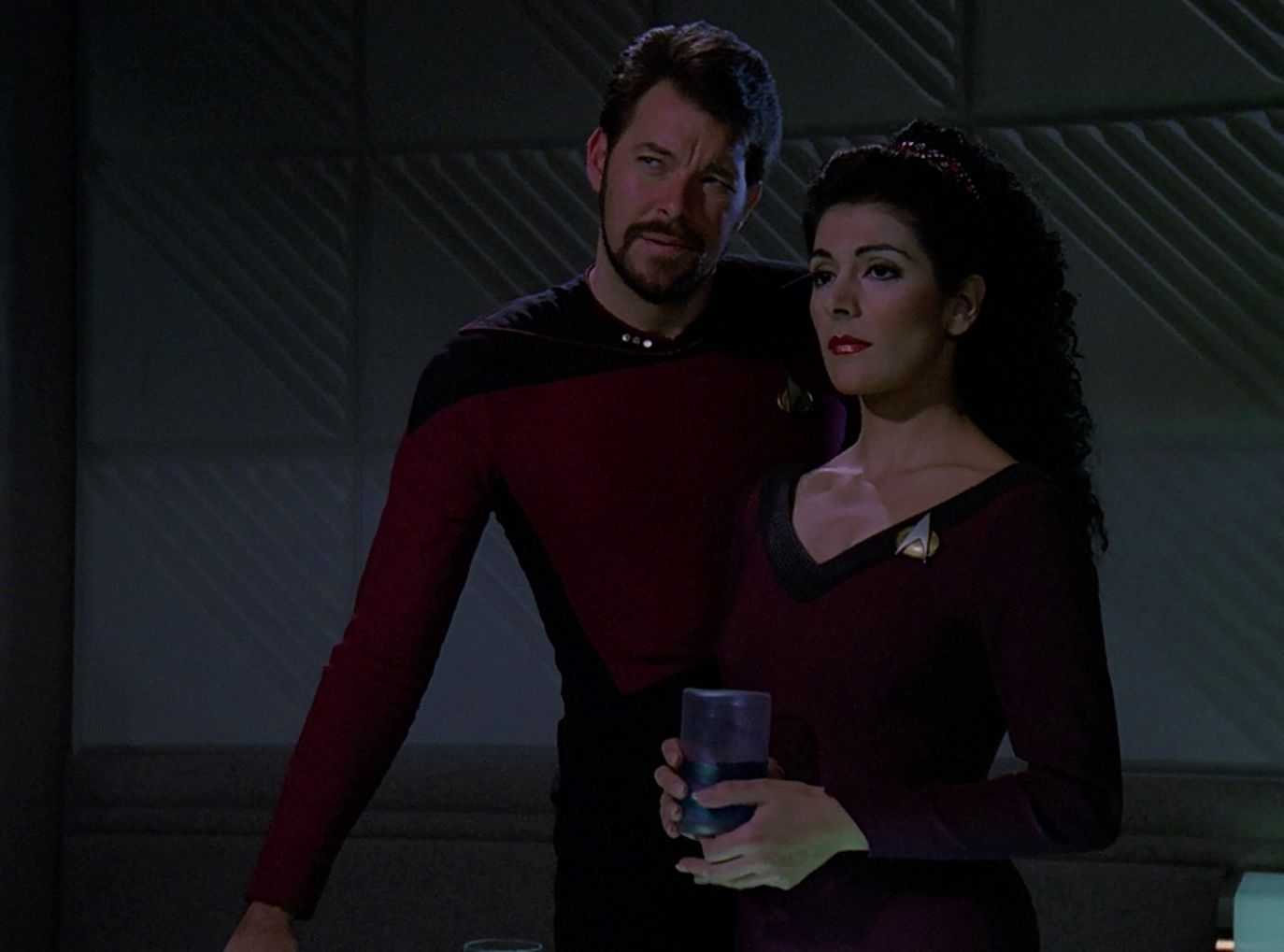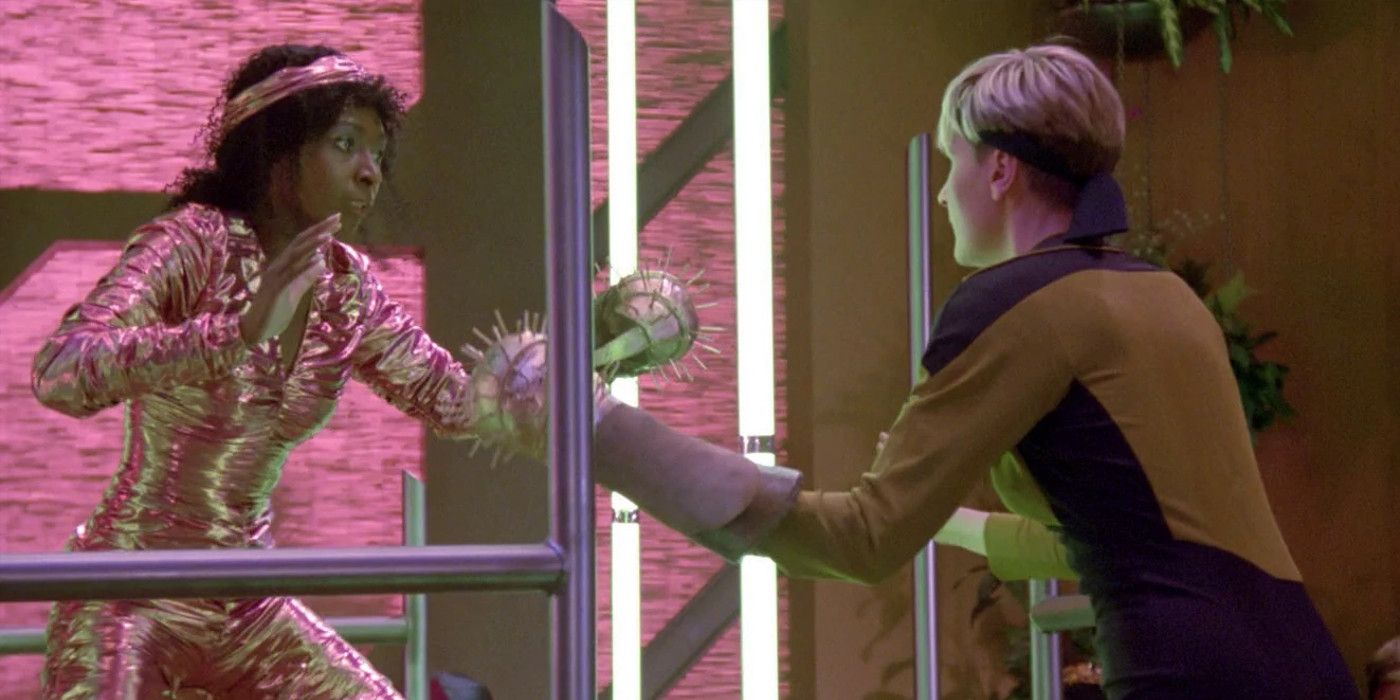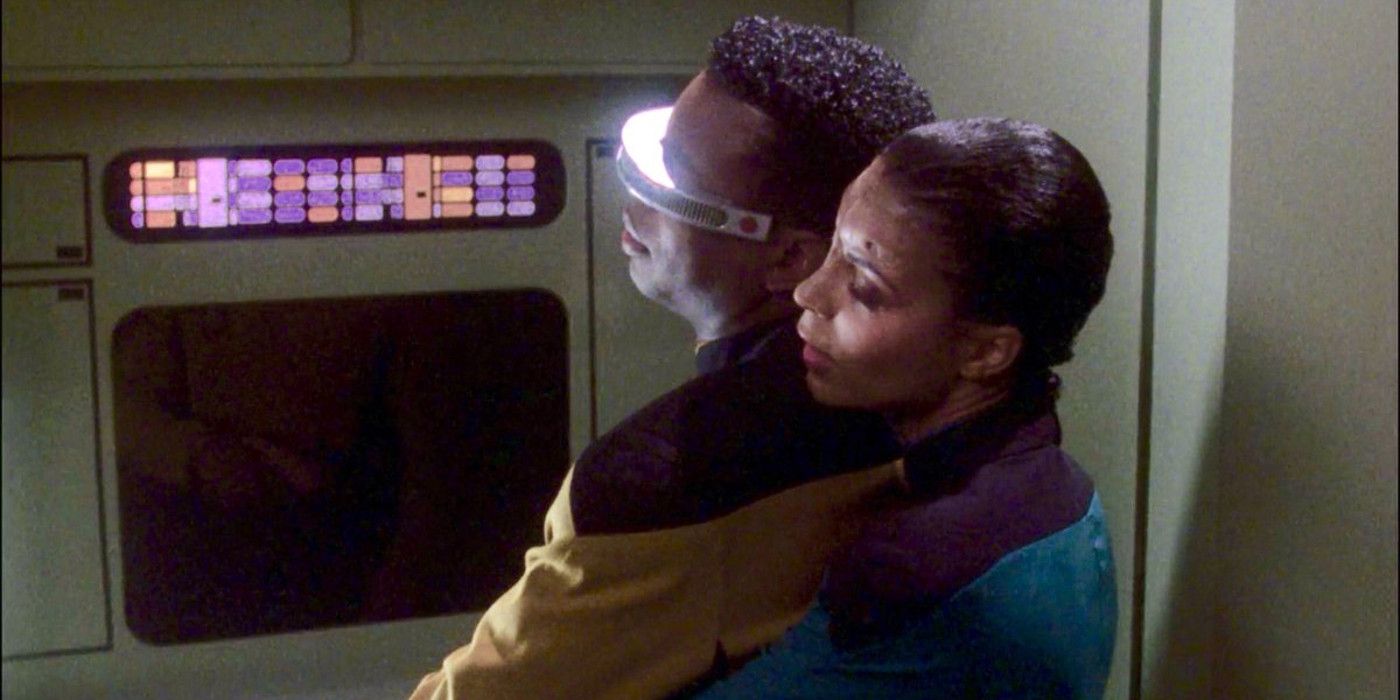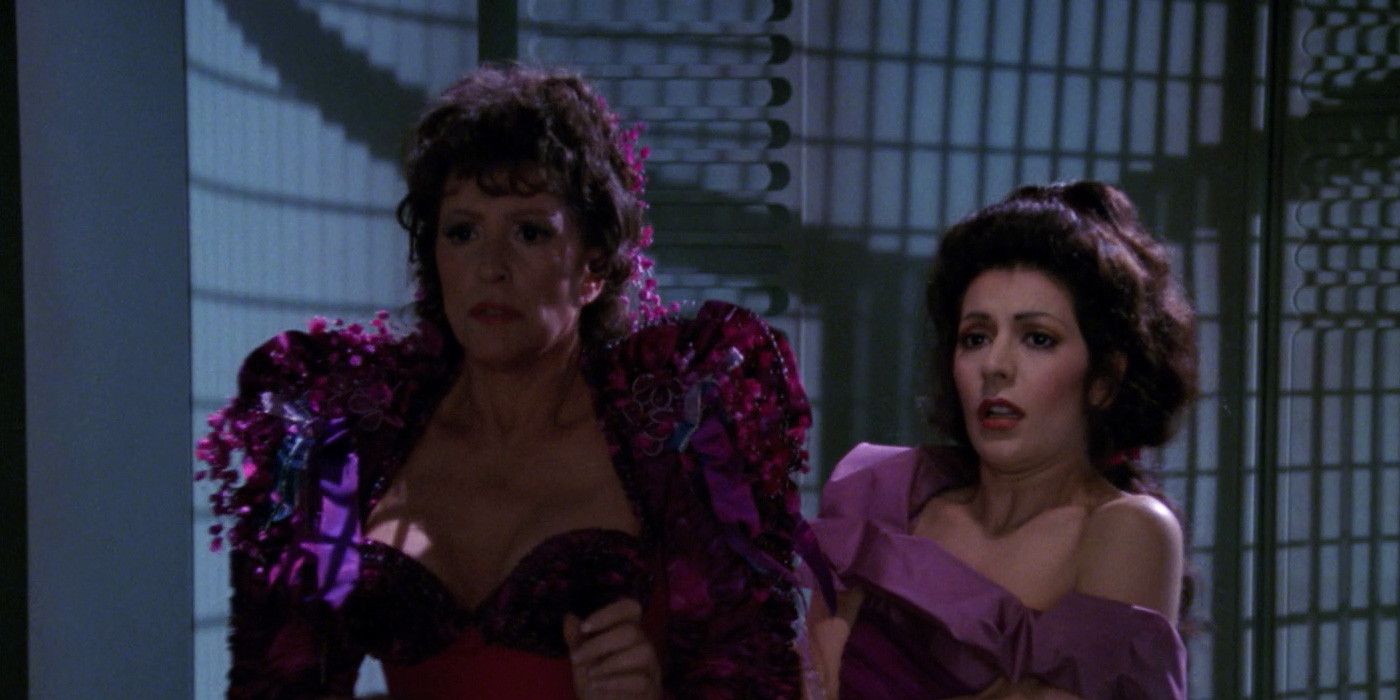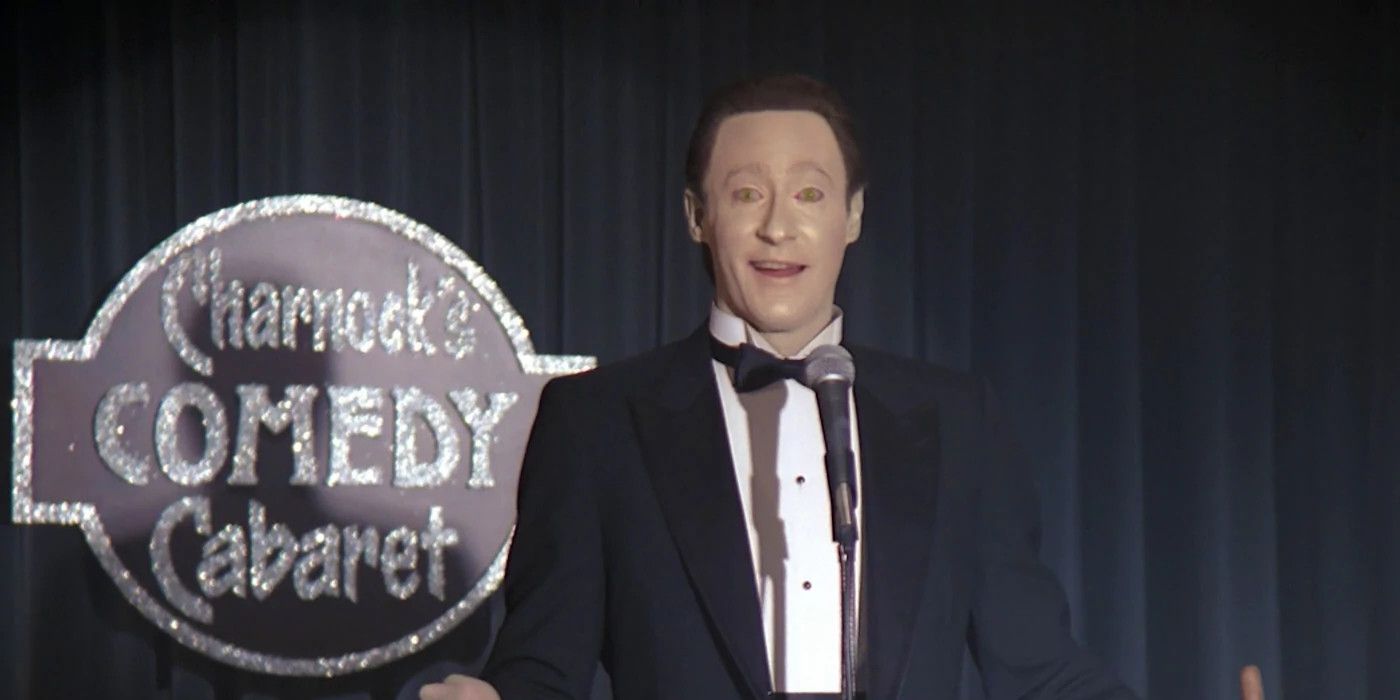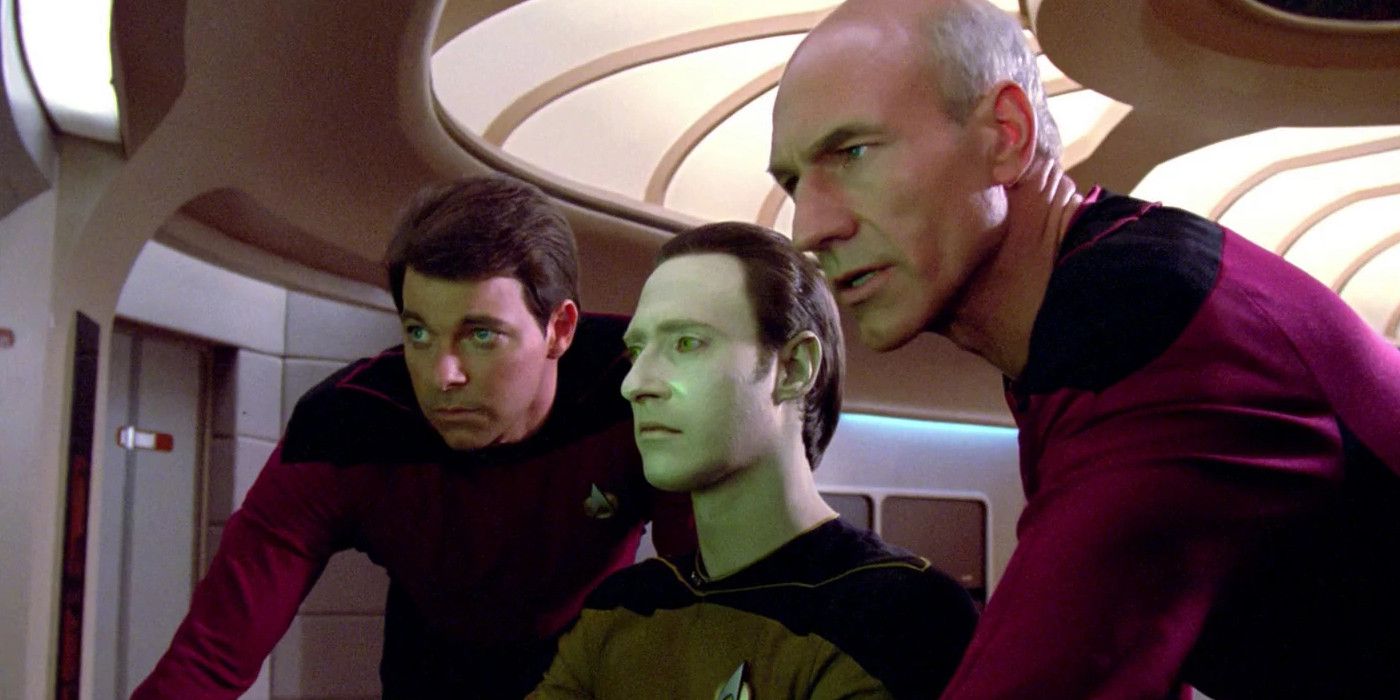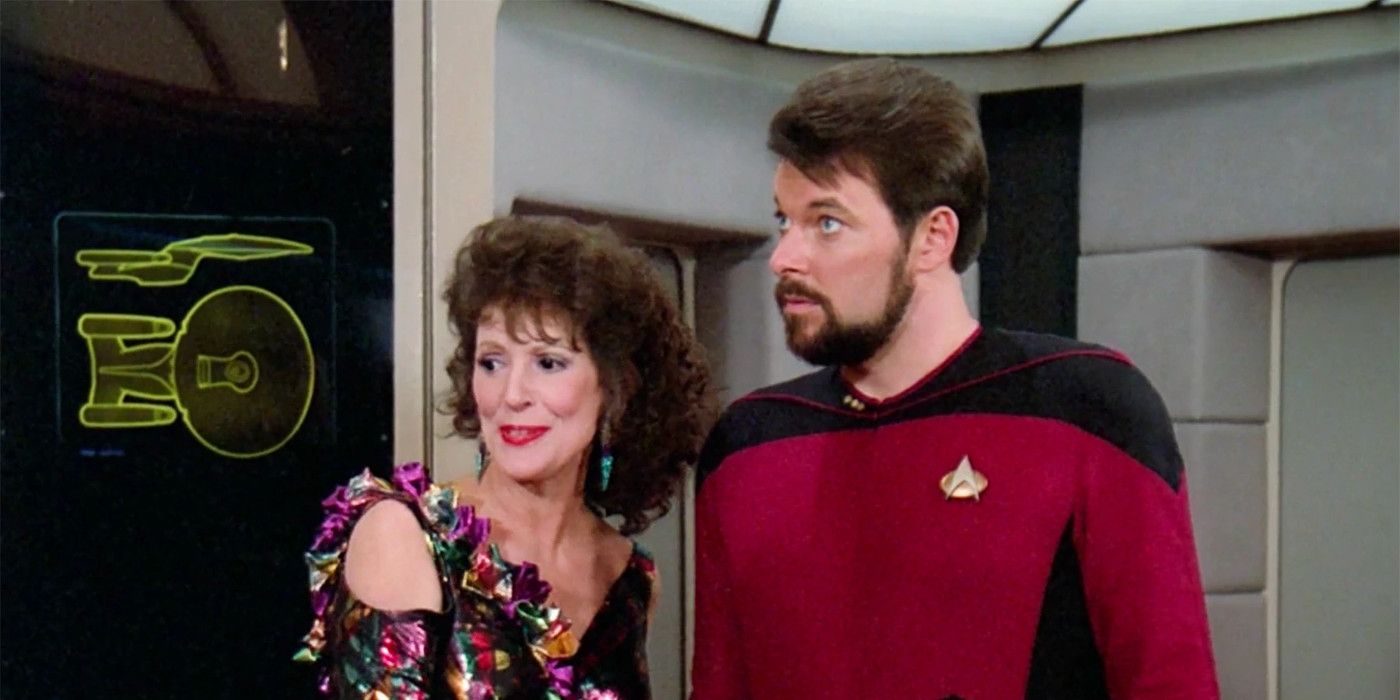Among all of the various iterations of Star Trek, the seven seasons of Star Trek: The Next Generation some of the most beloved. From Captain Picard's cerebral refinement to Data's unique combination of competence and developing personality, there was no shortage of colorful characters to care about. The storylines were generally better than previous Star Trek tales, and TNG quickly became a fan favorite. That said, there are some things about the show that the cast, producers, and crew may still blush over.
While The Next Generation is episodic, it did occasionally support longer story arcs that didn't always seem to turn out as planned. At best, these were minor jabs that made fans grimace before moving on. At worst, they were major missteps about which we must laugh, if only to avoid screaming. Granted, it's hard to write good sci-fi. Over seven seasons and hundreds of episodes, it's unrealistic to expect TNG to hit the mark every time. Still, when we look back, some of the most significant parts of the series that jump out at us are the parts that fell flat, despite the best efforts of every writer in the TNG workroom.
Those are the arcs that we memorialize today. It is not out of hate for this wonderful show that we highlight its weaknesses, but out of love for a series that has grown through many a flaw and still come out as a classic of science fiction television.
Here are 2 0 Storylines Star Trek: The Next Generation Wants Us To Forget.
Geordi falls in love with a hologram
It's fair to say that Geordi is unlucky in love. He tries, fails, and tries again. Isn't that just like a geek? His first real cringer of a romance happens in season 3, when he needs to repair the Enterprise's warp drive and summons a hologram of a famous warp engineer to help him. He then proceeds to fall in love with that hologram.
To make matters worse, the real woman shows up in season 4. Geordi tries to woo her, using all the little personality quirks that he knows from his weird hologram of her from the previous season, only to find out that she's married. Also, she discovers the hologram, which is extremely uncomfortable.
Worf and Troi as a couple
As early as season 5, TNG toyed with the idea of Worf and Troi together. This slow burn finally manifested a couple seasons later, although the relationship obviously didn't last. Why would it? They're fine when they're supporting Alexander as he figures out his relationship with Worf and his mixed cultures, but they don't need to be closer than that.
Throughout the series, Worf consistently goes for rough, tough ladies who can hold their own in a scrap-- unlike Worf himself, whose role on the Enterprise is apparently getting trounced. Troi is cerebral and waifish. Aside from work and Alexander, they don't seem to have much common ground. Maybe that's why she eventually marries Riker instead.
A planet of female bigots
Star Trek: The Original Series is famous for using science fiction to make good points about social issues. In season 1, Star Trek: The Next Generation did its best to dive right into this space. The result was a season that fans still laugh about. One of the most cringe-worthy examples of Trek trying to be socially conscious in season 1 happened in episode 14, when the crew visited a female-dominated planet that unfairly oppressed men.
If the episode had left its point there, then it might have succeeded as both a story and as social commentary. Instead, Riker got reomanced. It's not that it couldn't have happened, it was just clumsy and forced.
Picard's secret child
Season 7 had its high points, but by the seriess' close, the writers were either running out of ideas or determined to bang out some completely bananas episodes before the party was over. This may have been how episode 22 happened. In this episode, Picard meets a man who, thanks to alien trickery, appears to be his secret child.
Picard notoriously dislikes children, but luckily, his apparent offspring is 23 and has a chip on his shoulder that's more like a chunk. This inspires Picard to chase his surly supposed son for the entire 44 minutes, trying to offer life advice and get his progeny onto the straight and narrow. Everyone was glad when Picard warped away from this one.
The Enterprise becomes sentient
The Enterprise is as much of a Trek character as any of the crew. However, nowhere in the series is there any suggestion that the ship is at all sentient-- until season 7, episode 23. Here, the Enterprise tries to birth a sentient form of itself, which is a reasonable premise for a show which features an android whose highest aspiration is to tell a good joke.
Somehow, the ship's emerging self-awareness involves the patented Star Trek techno-babble and the holodeck, so basically, it's an excuse for the crew to embark upon a hallucinatory trip on the Orient Express. You read that right. The psychodrama that follows is chaotic, inconsistent, and weedy, and the potential intelligence of the ship is never addressed in the Trek universe again.
TNG's Ghost moment
Season 7, episode 14 is titled "Sub Rosa". Ironically, fans don't want to completely forget this storyline - it's celebrated as one of the worst that TNG ever produced. There are entire web pages devoted to its laughable storyline, which involves Beverly Crusher falling in love with a candle ghost entity that has apparently been in her family for generations. She even quits Starfleet for a minute over this phantasmal hunk.
It's a legit ghost story, complete with spooky fog in the transporter room, and viewing it is like watching Trek/paranormal Scottish romance crossover. Not that it mattered much as the series was winding down, but Crusher falling for a ghost? She can do better!
Not-so-merry men
Fans love Q episodes. Like the holodeck, Q was an excuse for the Trek crew to get into any situation, no matter how impossible or insane. He was also a snarky rogue with a fun screen presence. That's why season 4, episode 20 was so disappointing.
First, Q really outdid himself by sending the crew into historically accurate Robin Hood tights over, but worse still, Q himself didn't appear for much of the episode! He wasn't on screen for the entire time that Picard was trying to get his irritating lady love out of ye olde Medieval captivity. At least we got to see Worf angrily denying that he is a "merry man."
Picard vs his evil clone
Somewhere, once upon a time, someone attached high hopes to Star Trek: Nemesis. The final TNG storyline was clearly meant to be a momentous send-off for the cast, but instead got into some Jungian territory as both Picard and Data ended up essentially destroying their lesser clones. In Picard's case, he took his young evil clone down with a metal spike, and Data mind-swapped himself into the neural network of a less developed prototype of himself.
The entire movie painfaul and convoluted. The evil clone trope gives Picard a reason to agonize over his privilege, and Data's fake-out sacrifice recalls Spock's sacrifice without the pathos or stirring subsequent quest.
Wesley and the Traveler
Can we all agree that Wesley doesn't display traits of genius? Sure, he's a bright kid, but he's also immature, underfoot, and whiny. In season 1, an interdimensional super-being called the Traveler identifies him as a Mozart of time and space. Later, when Wesley has painted his life into a corner and has a terrible attitude, the Traveler shows up and rewards him by spiriting him away to interdimensional adventures and extracurricular space-time education a la Doctor Who.
Watching the Traveler realize how whiny and spoiled Wesley is might actually have been a good show. Alas, we saw as little of their interaction as we did evidence of Wesley's aptitude.
A planet of Native stereotypes
TNG got ambitious once in a while and decided to tackle race. Episode 20 of ssason 7, "Journey's End", was not the most cringeworthy of Trek's attempts to address racism, but it came close. On a planet of native stereotypes, Picard and the crew realize, after what you could call a very false start, that it's wrong to forcibly remove the native descendants from their land, even if there's a treaty involved.
This is the episode where the Traveler appears to Wesley in the guise of a wise and powerful chief who takes him on a mystical vision quest. If you're luckily enough not to have seen this, now that you know about it, you never need to seek it out.
The Ferengi are default dupes
Remember how the Ferengi are introduced in season 1? They're petty, cruel, and wicked, with no redeemable qualities whatsoever. Thank goodness Trek eventually rounded them out and treated them with a little respect!
Having a viciously foolish species around to hate on was contrary to the open-minded premise of Star Trek from the beginning. Even so, it took them a while to realize why it was bad to have a default stupid, bad race. In season 6, episode 7, TNG lets the Ferengi take over the ship. Then, the aliens are thwarted by the silly hijinks of the crew's kids. It's not just unlikely; it's typical of how the show consistently ragged on the Ferengi.
Darmok
Some fans really like season 5, episode 2, "Darmok", but think about it: if the alien Picard needs to talk to communicates only in references, then how did it learn what those references meant? There must be stories that utilize a traditional grammatical structure or the alien couldn't possibly know the stories it's referencing.
Maybe the alien was toying with Picard for the entire time they were trapped on the planet together, just stringing him along so he didn't have to deal with Picard's hyper-intellectual conversation and attempts to connect. As a strategy for avoiding rapport, this is brilliant. It turns out that Darmok is a bit of a bore, actually.
Tasha Yar's multiple departures
Tasha Yar's first premature exit happened in season 1, episode 23, as the actress wanted to leave the show. Two seasons later, Trek decided to let fans relive the heartbreak by bringing Tasha back for a "better" exit, where she nobly sacrifices herself, knowing ahead of time that she's not going to make it.
Honestly, that's no better than her throwaway demise in season 1, but it gets worse. As if seeing Tasha once more would make everything better, Trek brought her back in season 7 for the watershed (and otherwise great) episode "All Good Things". Let us heal, TNG!
Riker's many romances
Why did TNG ever let Riker make moves on anybody? He's awkward, unromantic, and sometimes downright inappropriate. The worst thing about them is that Riker clearly thinks he's a stud, even when he's being a complete card.
For example, in season 2, episode 18, "Up the Long Ladder", Riker has a cringe-worthy encounter with Brenna O'Dell, an Irish woman who cleans for him. He insults her, which makes her come onto him, and it’s awful. He stands up Troi, who eventually marries him, he takes skin-creepingly awkward sromance lessons from Guinan, falls into bed with Ro Laren during a memory lapse, and debases himself to sleep with a dominant woman from Angel 1.
The Enterprise runs into a lot of ethnically homogeneous planets
We already talked about the Native planet, the Irish planet, the Scottish planet, and the planet of white women. TNG kicked off the trend of ethnically homogeneous planets in season 1, where "Code of Honor" saw the crew interacting with a planet of black people who solve their problems with violence. It's overtly racist and misses a chance to make a really good point about how ignorant pre-23rd-century people used to mistreat non-white races.
It's also too bad Trek didn't learn from this terrible episode and avoid leaning on stereotypes again.
Geordi's love life continues to fail
Geordi just can't win. He has no luck whatsoever with women. He even has to shoot one of his love interests after se's revealed to be a malevolent shape-shifter intent on destroying him. On Aquiel, he falls in love with an accused criminal.
In a future timeline, he references being married to a woman named Leah. It's unclear whether this is Leah Brahms or not. If it is Leah, then Geordi not only techno-creeped on her, but broke up her marriage. If it's not, then Geordi must have found the most distressingly over-understanding Leah in the universe. That, or he gave up and married the hologram.
Troi constantly getting abducted
If there's anyone who has experience with alien impregnations, unwilling mental bonds, unwilling genetic bonds, Ferengi mind probes, and other forms of capture, it's Deanna Troi. Every season sees her in some kind of bind. In season 7, episode 18, her mind is captured by an empathic message. In season 6, episode 3, "Man of the People", an ambassador tries to possess her mentally. In episode 15 of season 5, "Power Play", Troi is among the crew members possessed by a hostile entity.
Why does Deanna get captured so much? Is it because she makes such a great damsel in distress? After the first three times, you'd think the Enterprise would get her some extra psychic defense training, or maybe a phaser.
Data's awkward progression toward humanity
Data tries so hard to be human that his earnestness usually carries his episodes. However, he makes a lot of really hard-to-square errors on the way. His attempt to learn about humor in season 2 resulted in some of his worst material, both comically and from the perspective of a developing human. Later, however, he also finds himself flying into Worf's arms in Wild West drag (that's season 6, episode 8, if you're interested) and taking on the personality of a powerful and dangerous god-queen in season 7.
Do positronic neural nets experience discomfort when they perceive nails on chalkboards? Fans certainly felt that way watching these episodes.
Weak callbacks to the original series
The worst of the TNG crossovers with TOS happened in season 1, episode 3, where Picard's Enterprise's crew got the same polywater infection that Kirk encountered. This was supposed to be cute and endearing wink to longtime fans, but there had been enough time since TOS that a lot of people watching the new Trek were first-timers. They didn't even know these characters yet!
Spock's appearance in season 5 was better, but Generations, the TOS/TNG crossover movie where Kirk and Picard met, was not a great success. The contrast between Patrick Stewart, a talented Shakespearean actor, and the more hammy Will Shatner was jarring. Still, the show tried dutifully to connect the two eras and maintain continuity, though it didn't always work.
Lwaxana Troi, the "cool mom"
Lwaxana's love life occupies an inordinate amount of TNG's time. In almost every episode where she appears, she discusses or references romance. She gets romantically involved with a captor at one point. In "Haven", she tells Deanna that her future father-in-law is attracted to her. She also hits on both Picard and Riker - remember, Riker and Troi have history - in the same episode when she's undergoing a regular Betazoid mating cycle.
It wouldn't be so bad if she weren't Deanna's mom, but all you can do is sympathize with the poor daughter whose mom keeps showing up and embarrassing her.
---
What storyline from Star Trek: The Next Generation would you like to forget? Let us know in the comments!

